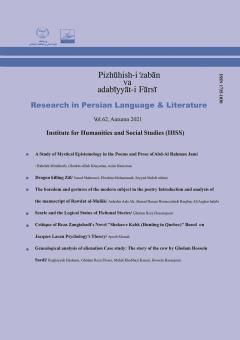Critique of Reza Zangiabadi's Novel "Shekar-e Kabk (Hunting in Quebec)" Based on Jacques Lacan Psychology’s Theory
Subject Areas : پژوهشهای ادبیات معاصر ایران
1 - Assistant Professor, Department of Persian Language and Literature, Payame Noor University, Iran.
Keywords: Psychological Critique, Jacques Lacan, The Process of Subjectivity, The Symbolic Realm, "Shekar-e Kabk (Hunting in Quebec)". ,
Abstract :
Jacques Lacan is undoubtedly one of the most influential figures in the science of psychology after Sigmund Freud, whose ideas have been influential not only in the field of psychology, but also in other fields such as literature, anthropology, social sciences and women's studies. The most important idea of this contemporary psychologist is to describe the process of individuality under the threefold system of imaginary and symbolic and the realm of reality. Reza Zangiabadi's novel "Shekar-e Kabk (Hunting in Quebec)" is one of the remarkable works of recent years, which, in addition to its success among the audience, has been selected as a novel by the jury of the 12th Golshiri Foundation Literary Award. This novel tells the story of an innocent teenager who turns into a ruthless murderer due to the hardships and events of life. The present article, written in a descriptive-analytical manner, seeks to examine the process of transforming Ghodrat from an innocent adolescent into a psychotic and isolated person, using Jacques Lacan's ideas. The results show that the transition of this character from the imaginary to the symbolic realm, which is accompanied by the absence of the mother, due to the negative and dysfunctional role of the father -which according to Lacan is the subject's psychological node in the symbolic realm- causes his permanent suspension and suspicion of social order. As a result, she has taken refuge in maternal objects. This is in conflict with the nature of the symbolic realm and results in mental disorders such as paranoia, fear, isolation and suspicion in the subject.
اونز، دیلن (1387) فرهنگ مقدماتی اصطلاحات روانکاوی لاکانی، ترجمة مهدی رفیع و مهدی پارسا، تهران، گام نو.
ایمان، محمدتقی و محمودرضا نوشادی (1390) «تحلیل محتوای کیفی»، پژوهش، سال 3، شمارة 2، صص 15-44.
برتنس، هانس (1394) مبانی نظریة ادبی، ترجمة محمدرضا ابوالقاسمی، تهران، ماهی.
پاینده، حسین (1388) «نقد شعر زمستان از منظر نظریة روانکاوی لاکان»، زبان و ادب فارسی، ش 42، صص 27-46.
----------- (1397) نظریه و نقد ادبی، درسنامهای میانرشتهای، ج 1، تهران، سمت.
تبریزی، منصوره (1393) «تحلیل محتوای کیفی از منظر رویکردهای قیاسی و استقرایی»، فصلنامة علوم اجتماعی، شمارة 64، صص 105-138.
جلالهوند آلکامی، مجید (1393) «راوی بوف کور، رانة مرگ و شکاف در نظم نمادین»، ادبپژوهی، شمارة 33، صص 9-36.
------------------ (1396) «راوی بوف کور در زنجیرة دالهای بیپایان نظم نمادین»، پژوهشنامة نقد ادبی و بلاغت، سال 6، شماره 1، صص 159-177.
حافظنیا، محمدرضا (1397) مقدمهای بر روش تحقیق در علوم انسانی، تهران، سمت.
زنگیآبادی، رضا (1398) شکار کبک، تهران، چشمه.
ژیژک، اسلاوی (1397) کژ نگریستن، ترجمة مازیار اسلامی و سالح نجفی، تهران، نشرنی.
شولتز، دوان (1398) نظریههای شخصیت، ترجمة یوسف کریمی و همکاران، تهران، ارسباران فروید، زیگموند (1382) «ماتم و ماخولیا»، ترجمة مراد فرهادپور، ارغنون، شمارة 21، صص 83-101.
------------ (1392) موسی و یکتاپرستی، ترجمة صالح نجفی، تهران، رخداد نو.
فیست، جس و گریگوری فیست (1384) نظریههای شخصیت، ترجمة یحیی سیدمحمدی، تهران، روان.
فینک، بروس (1397) سوژه لاکانی بین زبان و ژوئیسانس، ترجمة محمدعلی جعفری، تهران، ققنوس.
مرادی، نرگس و علی تسلیمی و محمدعلی خزانهدارلو (1397) «معشوق ایدهآل؛ معشوق- مادر.
بررسی لکانی عشق در شعر سرمای درون احمد شاملو»، ادبیات پارسی معاصر، سال 8، شماره 1، صص 195-220.
موللی، کرامت (1395) مبانی روانکاوی فروید-لکان، تهران، نشرنی.
هومر، شون (1396) ژاک لاکان، ترجمة محمدعلی ابراهیمی و محمدابراهیم طاهایی، تهران، ققنوس.


